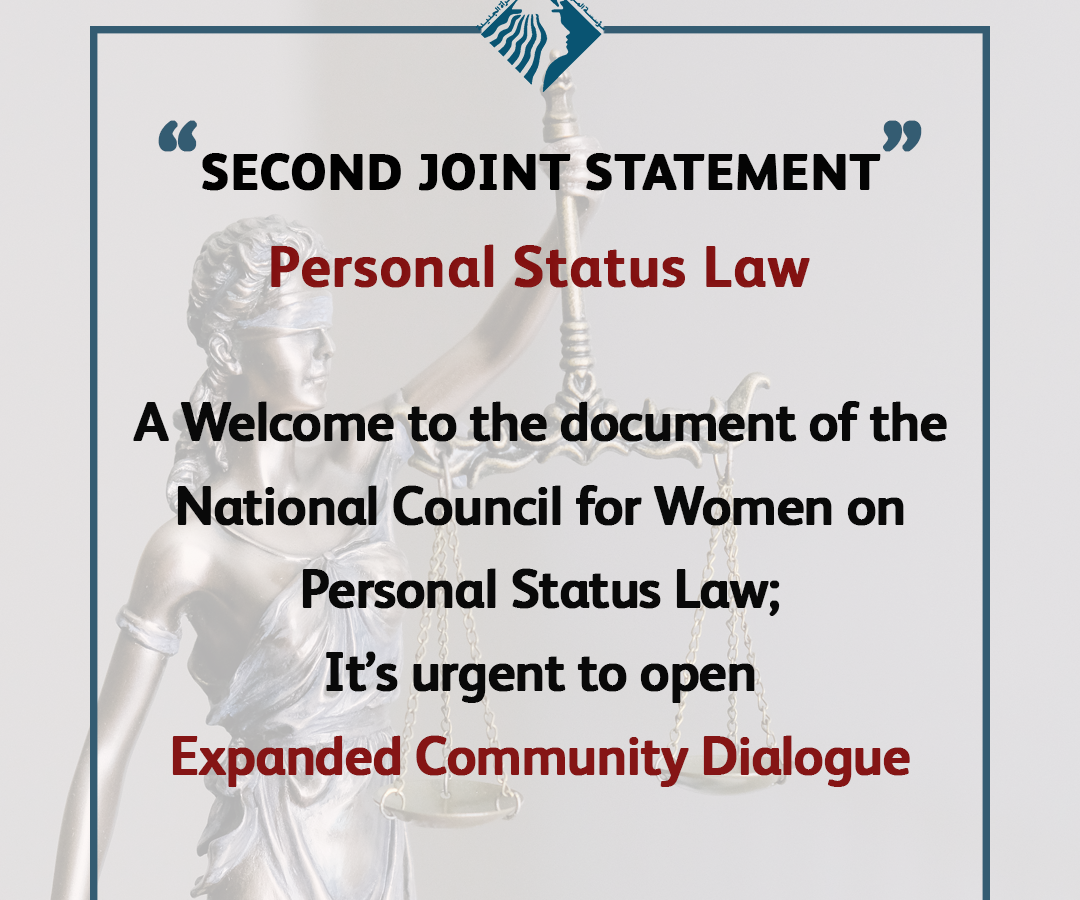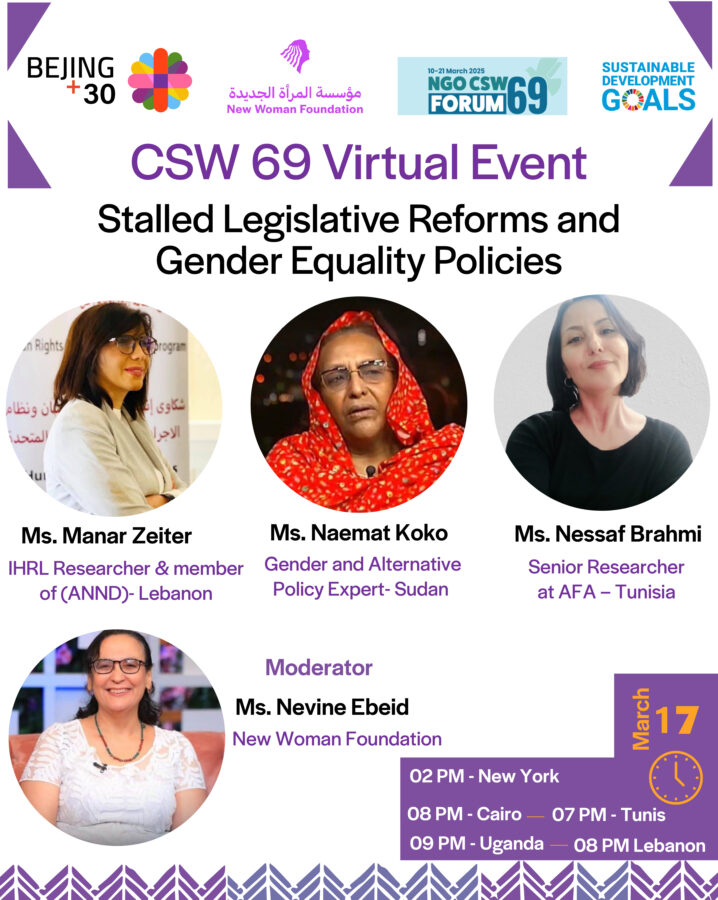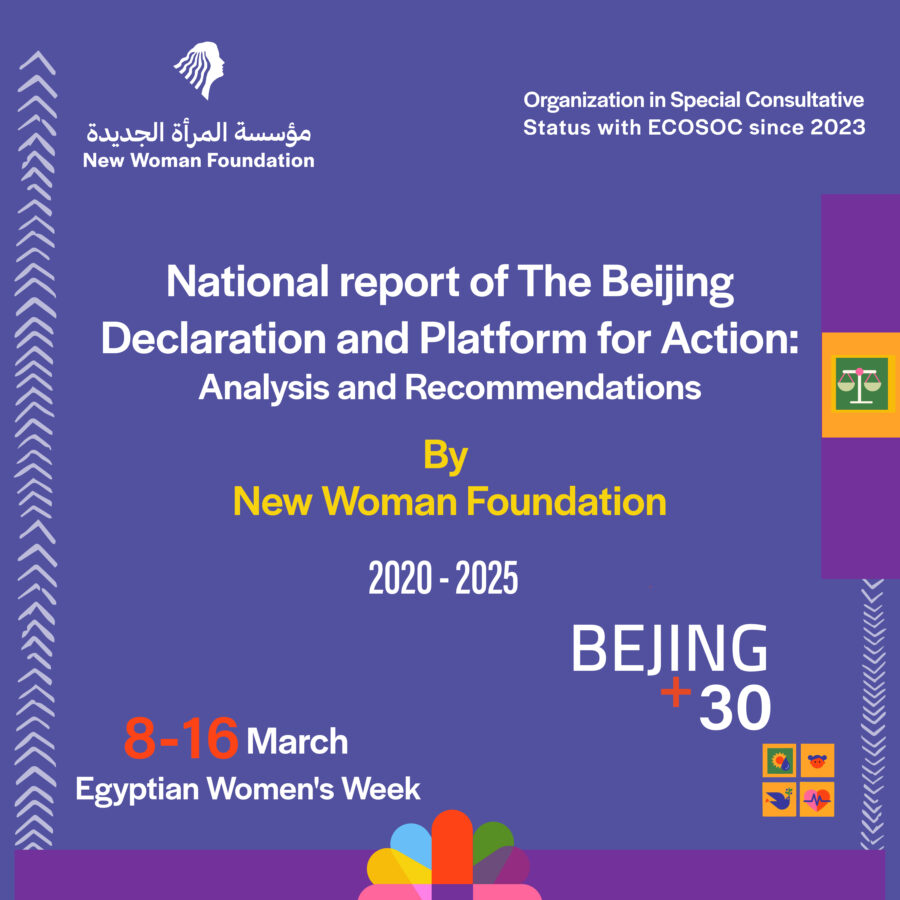- Contact Us
- 0020233382706
- nwrc@nwrcegypt.org
Second Joint Statement on Personal Status Law

First Joint statement on Personal Status Law
May 11, 2022
C190 – Confronting Violence and Harassment in the World of Work Convention
June 27, 2022The Statement is open for signature submission.
Second Joint Statement on Personal Status Law
A Welcome to the document of the National Council for Women on personal status law; it’s urgent to open expanded community dialogue.
On the official website of the National Council for Women, we have read the document “Determinants and Legislative Requirements for Amendments to Personal Status Laws”. We express our appreciation for the prompt and remarkable response of the national machinery in dealing with the current momentum on personal status law. We hope that successive interventions of the national machinery will always be frequent at the level of introducing policies and proposals.
The document “Determinants and Legislative Requirements for Amendments to Personal Status Laws” reflects the council’s interaction with the initiatives of the feminist movements. The document contains numerous theses and interventions in the draft personal status laws and other relevant drafts laws issued by civil society organizations.
The general framework of the document refers to six main points; the significant points are (the affirmation of the full-legal capacity of a woman, the protection of her rights and freedoms under the constitution, the preservation of her acquisitions, and the guarantee to obtain them). We propose to the general framework to add the personal status law based on the reference of binding international obligations and conventions on the rights of women and children. It is a constitutional obligation.
Regarding the problems and procedural aspects dealt with in the document, they were limited to predominant cases of women, while the National Council for Women document is supposed to reflect the interests of all Egyptian women without any discrimination. It is an inherent constitutional right of all citizens of both genders. This is prompting us to reaffirm the rule of law and the right to equality under the law for all without discrimination, as a major regulator to organize citizens’ relationships with each other with broad diversity and regulate everyone’s relationship with the state.
Tentatively, we highly value this document. However, it needs to open a dialogue about it and build a broad consensus that will promote priorities that cannot be regressed if the country witnesses a new personal status law. On the other hand, we emphasize the continuation of our movement towards a “civil law of personal status”. This will uphold the rule of the constitution and the law as a comprehensive reference for the citizenship of all Egyptians of both genders and uphold the rule of law in accordance with a harmonious constitution that organizes the relationship between citizens in the family.
We hope that the National Council for Women will undertake several community dialogue events on the document. Also, we hope that the dialogue table will bring together a broad spectrum of stakeholders in a new personal status law with significant participation. Consideration of the draft law is not limited to the Ministry of Justice, apart from the visions and discussions of the feminist movement and civil society organizations.
Signatures of institutions and individuals;
Institutions:
New woman foundation
Cairo Foundation for Development & Law
Center for Egyptian Women Legal Assistance
El Nadim Center For Management & Rehabilitation of victims of violence
Tadwein Center for Social Gender Studies
Edraak Foundation for Development & Equality
Egyptian Without Borders Foundation
The Forum for Women in Development
The National Front for Egyptian Women
Daughter of The Earth Association – Mansoura
Campaign for a Unified Civil Code of Personal Status
Superwoman initiative
Speak up initiative
Sanad initiative
Barah Amen initiative/ Safe space initiative
Sout to support women’s rights initiative
El Hak Foundation for Freedom of Expression and Human Rights
Volunteers Network for Development and Human Rights
SAAND Program
Sabiya Association for Woman and Child
Scientific Association for Horticultural Development
Kahila Initiative
Women & Society Association
Individuals:
Bothaina Kamel- Mediaperson
Basant Hassan Salama – Writer and media person
Maha Al Aswad – Researcher
Shahinaz Abdel Salam – Feminist and engineer
Karima Abou El Nour – Political Psychologist
Samar Adel – Economist – Researcher in Political Psychology
Ilham Aidaros – Politician and translator
Rawya Karsha – An Egyptian citizen
Dr. Jihad Mohamed – Professor at the Agricultural Research Center
Nahla El Dabaa – Sabya Association for Women and Children
Heba Adel – Egyptian female foundation, Lawyer in cassation
Amira Abdel Hakim – Lawyer
Hala Mostafa – Egyptian citizen
Michael Raouf Helmy – Egyptian lawyer
Ahmed Mansour – Researcher
Nadia Abdel Wahab – Doctor
Amani Abu Zaid – Chairman of the board of directors of Amakan for Technical Services
Zainab Abdel Latif – Director of Helwan for Community Development
Karima El Hefnawy – Pharmacist
Hayat El-Shimy – Artist
Amal El-Sayed – Researcher
Faten Adly – Researcher
Ashraf El Bahrawy – Engineer
Mona Abdel Radi – Journalist
Somaya Mohamed Adly – Chemist
Heidi Talaat Raei – Human resources Specialist
Dai Saad Rahmy – Translator
Shadia Mohamed Ali – Engineer
Mona Hamed Emam – Doctor
Magda Adly – Doctor
Adel Ibrahim Omari – Doctor
Hebatullah Ali Muhammad – Visual artist
Dr. Mounir Mujahid – Engineer
Nesma Al-Khatib – Lawyer
Samuel Tharwat – Lawyer
Ayat Al Habal – Journalist
Rasha Al-Jabali – Syndicalist
Eman Al-Darby – Chief editor of Hawa magazine
Yasmine Jibril – Doctor and public health researcher
Rania Hilal – Journalist
Mona Abdel-Radi – Journalist
Suzanne Nada – Lawyer
Shadi Abdel Karim – Legal Researcher
Dr. Salwa El-Antari – Economic researcher
Omaima Imad El-Din – Founding member of the Bread and Freedom Party (under establishment)
Amal Mamdouh – Egyptian citizen
Mohamed Abdel Hakim Ibrahim – Cooperative Consultant
Ashraf Abdel-Wanis El-Deljawi – Worker



